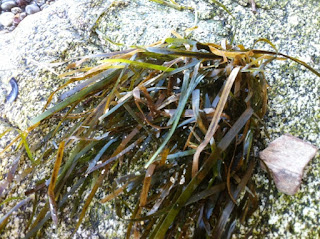 | |
| Stone 33 with eelgrass |
Jennifer Hahn spoke to the Washington Native Plant Society last night about her new book Pacific Feast. Her talk was entertaining and informative. I learned a lot about the strange seaweed species I see on the beach from time to time. I am not an adventurous eater, so I can't see eating most of the plants and animals she talked about. Even if I wanted to, it would not be legal or healthy to eat these things in Eagle Landing Park. Except for the berries. If people want to eat Himalayan blackberries, they definitely should. The environment would be better served if people removed the whole blackberry plant rather than just eating the berries. As for clams and seaweed, it is not legal to harvest them in Eagle Landing Park, and the water is too polluted. I wish she had a recipe for English Ivy Casserole.
Hahn emphasized stewardship, which is good. Her thesis is that eating local is good for the environment and good for your health. The main problem with this is that people should not be foraging for food on public lands near population centers because those lands need protection from overuse and abuse. If you go to the wild, remote areas where Hahn's advice could be followed, you are no longer very local. You've used those resources to travel 30 miles for one meal, or five meals. This is not environmentally sound or sustainable. I could see Hahn's book being useful for people who are going hiking or camping anyway. I don't see how the majority of people could get a benefit from her book, or benefit the environment, unless they are eating dandelions and blackberries.
Hahn suggested that when we take from the wild, we pause to say thank you to the environment for its gifts. This puts one in the right frame of mind, acknowledging that the Earth does not belong to us to exploit and that we have a duty to be good stewards. I support her suggestion, and I would be grateful if more people had that mindset. However, a better way to say thank you to the environment is to stop destroying it. The lifestyle of the average American is not sustainable or environmentally sound. I would venture to say that most environmentalists have not achieved a lifestyle where they do more good than harm to the planet. I know that is my goal, to be a part of the solution and not the problem, and I have not achieved that goal. Rather than pausing to say thank you to the environment when you take a fish or a clam or a handful of berries, it would be better for all if you said thank you by not driving your car or buying that new TV.
No comments:
Post a Comment